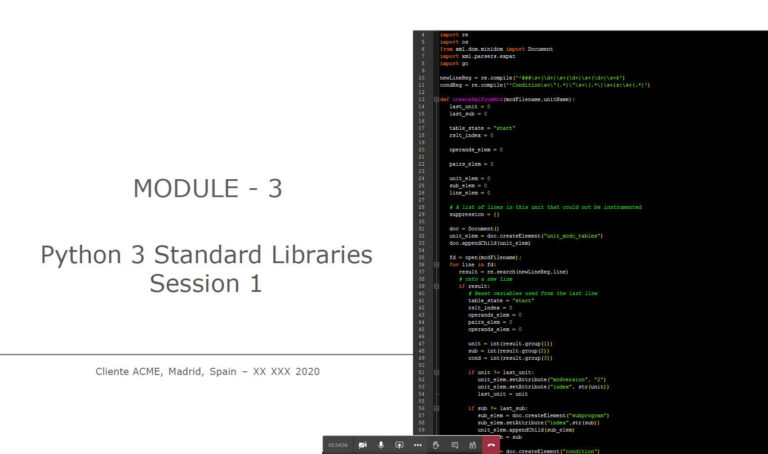Online course on demand
Aimed at people who perform Software Verification tasks in order to help them in test automation tasks through the use of scripts written in Python.
Using AI-assisted learning techniques, participants will learn the fundamentals of Python, explore standard and third-party libraries, and dive into test automation frameworks. The course focuses on hands-on experience to develop effective test automation skills.
Course format
Duration: 24 hours, taught over 5 days (5 hours each day, except Friday).
Format: Instructor-led online training
The course is taught in Spanish or English, with slides in English.
The course is divided into 9 modules that can be taken as a whole or by selecting those that are of interest to you.
Prerequisites
- Basic knowledge of programming concepts
- Familiarity with software testing principles
- Previous Python experience is not required, but is useful
- A laptop is required is required for the internship.
Target audience
This course is ideal for:
- Verification engineers looking to automate their test processes
- Software developers interested in improving their testing skills
The Trainer
Miguel Miranda
Miguel Miranda has more than 20 years of experience as a software consultant specialized in Python and other programming languages. He has extensive experience in the use of AI-based tools for software development and process automation.
Course syllabus
Day 1: Python language
Module 1: Introduction to Python
- Why Python?
- History and versions of Python
- Python implementations
- Python 2 vs Python 3
- Coding Style Guidelines (WBS 8)
- Python package and virtual environment management
Module 2: Python Fundamentals
- Keywords and operators
- Basic data types and data structures
- Control structures
- Exceptions
- Integrated functions
Module 3: Advanced Python Concepts
- Functions, classes, modules and packages
- Lambda functions
- List comprehensions
- Generators
- Decorators
- Data types
Day 2: Python Standard Library
Module 4: Basic features of the standard library
- Runtime characteristics
- Application building blocks
- File system operations
- Text processing and regular expressions
Module 5: Data management and analysis
- Dates and times
- Persistence and data exchange
- Data compression and archiving
- Cryptography
- Mathematics and data analysis
Module 6: Advanced Standard Library Topics
- Simultaneity with processes
- Internet/Web networks and services
- GUI frames (brief overview)
Day 3: Python Test Frameworks
Module 7: Testing basics
- Source code verification
- Unit testing with pytest
- Property-based tests with hypotheses
Module 8: Advanced testing techniques
- Mutation testing
- Behavior-based testing with Behaviour
- Keyword and data-driven testing with Robot Framework
Module 9: Practical application: creating your own test automation tool
In this final module, you will apply the knowledge and skills acquired throughout the course to develop a practical test automation tool of your choice. This hands-on project integrates Python programming, test frameworks and AI-assisted development.
Choose a project, add value to your testing workflow or address a specific challenge in your work environment.
Sample project ideas:
- AI-enhanced test case generator
- Automated API testing for web applications
- Behavior-driven development (BDD) test automation framework



